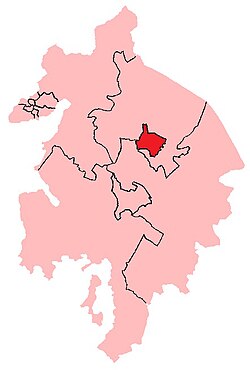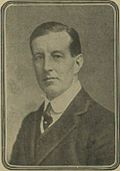Parliamentary constituency in the United Kingdom, 1885–1945
Coventry was a borough constituency which was represented in the House of Commons of England and its successors, the House of Commons of Great Britain and the House of Commons of the United Kingdom .
Centred on the City of Coventry in Warwickshire , it returned two Members of Parliament (MPs) from 1295 until the Redistribution of Seats Act 1885 , when its representation was reduced to one. The Coventry constituency was abolished for the 1945 general election , when it was split into two new constituencies: Coventry East and Coventry West .
Elections were held using the bloc vote system when electing two MPs (until 1885), and then first-past-the-post to elect one MP thereafter.
1832–1868 : The City of Coventry and the suburbs thereof.[ 1]
1868–1918 : The existing parliamentary borough and the Parish of Stoke.[ 2]
The constituency was unchanged by the Representation of the People Act 1884 .[ 3] [ 4]
1918–1945 : The county borough of Coventry.[ 5]
In the eighteenth century Coventry was, despite its size, known as a corrupt borough.[ 6]
Members of Parliament [ edit ] Year 1st Member 1st Party 2nd Member 2nd Party 1660, March Richard Hopkins Robert Beake 1660, August William Jesson 1661 Sir Clement Fisher, Bt Thomas Flynt 1670 Richard Hopkins 1679, Feb Robert Beake 1679, August John Stratford 1685 Sir Roger Cave, Bt Sir Thomas Norton 1689 John Stratford 1690 Richard Hopkins 1695 George Bohun Thomas Gery 1698 Sir Christopher Hales, Bt Richard Hopkins 1701, Jan Thomas Hopkins 1701, Dec Edward Hopkins 1702 Thomas Gery 1707 Sir Orlando Bridgeman, Bt Whig Edward Hopkins 1710, Oct Robert Craven Thomas Gery 1710, Dec Clobery Bromley 1711 Sir Christopher Hales, Bt 1713 Sir Fulwar Skipwith, Bt 1715 (Sir) Adolphus Oughton [ 10] Sir Thomas Samwell, Bt 1722[ 11] John Neale 1734 John Bird 1737, Feb John Neale 1737, Apr Earl of Euston 1741 William Grove 1747, Jun Viscount Petersham 1747, Dec Samuel Greatheed 1761 James Hewitt Hon. Andrew Archer 1766 Hon. Henry Seymour-Conway 1768 Sir Richard Glyn, Bt 1773 Walter Waring 1774 Edward Roe Yeo Tory [ 12] 1780, Feb John Baker Holroyd Tory [ 12] 1780, Oct Election abandoned due to rioting; both seats vacant [ 12] 1780, Dec[ 13] Sir Thomas Hallifax Whig [ 12] Thomas Rogers Whig [ 12] 1781 Edward Roe Yeo Tory The Lord Sheffield Tory [ 12] 1783 Hon. William Seymour-Conway 1784 Sir Sampson Gideon, Bt [ 14] John Eardley Wilmot 1796 William Wilberforce Bird Whig [ 12] Nathaniel Jefferys Tory [ 12] 1802 Francis William Barlow Tory [ 12] 1803 Peter Moore Whig [ 12] 1805 William Mills Whig [ 12] 1812 Joseph Butterworth Whig [ 12] 1818 Edward Ellice Whig [ 15] [ 16] [ 17] [ 18] [ 19] [ 12] [ 20] 1826 Richard Edensor Heathcote Tory [ 12] Thomas Bilcliffe Fyler Tory [ 12] 1830 Edward Ellice Whig [ 15] [ 16] [ 17] [ 18] [ 19] [ 12] [ 20] 1831 Henry Bulwer Whig [ 12] 1835 William Williams Radical [ 20] [ 21] [ 22] 1847 George James Turner Conservative 1851 Charles Geach Radical [ 23] [ 24] [ 25] [ 26] 1854 Sir Joseph Paxton Whig [ 27] 1859 Liberal Liberal 1863 Morgan Treherne Conservative 1865 Henry Eaton Conservative 1867 Henry Jackson Liberal 1868, March Samuel Carter Liberal 1868, November Alexander Staveley Hill Conservative 1874 Sir Henry Jackson, Bt Liberal 1880 William Wills Liberal 1881 Henry Eaton Conservative 1885 representation reduced to one member
Elections in the 1830s [ edit ] Ellice was appointed Secretary at War , requiring a by-election.
Elections in the 1840s [ edit ] Elections in the 1850s [ edit ] Turner resigned after being appointed Vice-Chancellor of the High Court , causing a by-election.
Geach's death caused a by-election.
Phillimore retired from the contest two hours into polling.[ 35] Elections in the 1860s [ edit ] Ellice's death caused a by-election.
Paxton's death caused a by-election.
Treherne's death caused a by-election.
The by-election was declared void on petition due to bribery by Jackson's agent.[ 38]
Elections in the 1870s [ edit ] Elections in the 1880s [ edit ] Jackson resigned after being appointed a judge on the Queen's Bench Division of the High Court of Justice , causing a by-election.
Eaton was elevated to the peerage, becoming Lord Cheylesmore, causing a by-election.
Elections in the 1890s [ edit ] Murray Elections in the 1900s [ edit ] Mason Elections in the 1910s [ edit ] Mason Mason had opposed the war and was replaced as Liberal candidate by Mansel who supported the Coalition Government. Bannington was the candidate of the National Federation of Discharged and Demobilized Sailors and Soldiers .[ 43]
Elections in the 1920s [ edit ] Elections in the 1930s [ edit ] ^ "The statutes of the United Kingdom of Great Britain and Ireland. 2 & 3 William IV. Cap. LXIV: An Act to settle and describe the Divisions of Counties, and the Limits of Cities and Boroughs, in England and Wales, in so far as respects the Election of Members to serve in Parliament" . London: His Majesty's statute and law printers. 1832. pp. 300– 383.^ "A Collection of the Public General Statutes: 1867/68. Cap. XLVI. An Act to settle and describe the Limits of certain Boroughs and the Divisions of certain Counties in England and Wales, in so far as respects the Election of Members to serve in Parliament" . London: Eyre and Spottiswoode. 1868. pp. 119– 166.^ a b Debrett's House of Commons & Judicial Bench, 1886 ^ Hesilrige, Arthur G. M., ed. (1918). Debrett's House of Commons and the Judicial Bench, 1918 ^ Fraser, Hugh (1918). The Representation of the People Act, 1918: with explanatory notes ^ Pages 102 to 105,Lewis Namier , The Structure of Politics at the Accession of George III ^ a b c d e f g h i j k l m n o p q r s t u v w x y z aa ab ac "British History Online" . Retrieved 17 September 2011 .^ a b c d e f g h i j k l m n "History of Parliament" . Retrieved 18 September 2011 .^ a b c d e f g h i j "History of Parliament" . Retrieved 18 September 2011 .^ Created a baronet, August 1718 ^ The election of 1722 was declared void because of the "notorious and outrageous Riots, Tumults and Seditions ... in Defiance of the Civil Authority, and in Violation of the Freedom of Elections", and a new writ was issued, but the original victors (Oughton and Neale) were returned once more at the by-election. ^ a b c d e f g h i j k l m n o p q r s t u v w x Stooks Smith, Henry (1845). The Parliaments of England, from 1st George I., to the Present Time. Vol II: Oxfordshire to Wales Inclusive 98– 100. Retrieved 1 November 2018 – via Google Books . ^ On petition, the election of Hallifax and Rogers was declared void, and their opponents, Yeo and Seymour-Conway, were declared to have been duly elected and seated in their place ^ Changed his surname to Eardley, July 1789; created The Lord Eardley (in the Peerage of Ireland , September 1789 ^ a b Colthart, James M. (1976). "Edward Ellice" . Dictionary of Canadian Biography, vol. IX ISBN 0-8020-3319-9 {{cite book }}: CS1 maint: location missing publisher (link )^ a b "Rt. Hon. Edward Ellice" . Legacies of British Slave-ownership . University College London. Retrieved 6 May 2018 .^ a b Bloy, Marjorie. "Edward Ellice, the elder (1781–1863)" . A Web of English History . Retrieved 6 May 2018 . ^ a b Escott, Margaret. "ELLICE, Edward (1783–1863), of Wyke House, nr. Brentford, Mdx" . The History of Parliament . Retrieved 6 May 2018 . ^ a b Miller, Henry (2015). Politics Personified: Portraiture, Caricature and Visual Culture in Britain, c. 1830–80 ISBN 978-0-7190-9084-4 . Retrieved 6 May 2018 . ^ a b c Churton, Edward (1838). The Assembled Commons or Parliamentary Biographer: 1838 . Retrieved 21 August 2018 – via Google Books .^ "Latest Intelligence" Gloucester Journal . 10 August 1850. p. 3. Retrieved 22 October 2018 – via British Newspaper Archive .^ "Imperial Parliament" Exeter and Plymouth Gazette . 10 August 1850. p. 8. Retrieved 22 October 2018 – via British Newspaper Archive .^ "Election Intelligence" Norfolk News . 12 April 1851. p. 2. Retrieved 6 May 2018 – via British Newspaper Archive .^ a b "Wednesday & Thursday's Posts" Stamford Mercury . 11 April 1851. p. 2. Retrieved 6 May 2018 – via British Newspaper Archive .^ "Local & General Intelligence" Newcastle Journal . 12 April 1851. p. 5. Retrieved 6 May 2018 – via British Newspaper Archive .^ "Local News" Derby Mercury . 9 April 1851. pp. 2– 3. Retrieved 6 May 2018 – via British Newspaper Archive .^ "Commercial" Dundalk Democrat, and People's Journal . 25 November 1854. p. 2. Retrieved 6 May 2018 – via British Newspaper Archive .^ a b Escott, Margaret. "Coventry" . The History of Parliament . Retrieved 10 April 2020 . ^ a b c d e f g h i j k l m n o p q r s t Craig, F. W. S. , ed. (1977). British Parliamentary Election Results 1832-1885 (1st ed.). London: Macmillan Press. ISBN 978-1-349-02349-3 ^ "Coventry Election" Coventry Herald . 21 July 1837. p. 4. Retrieved 10 April 2020 – via British Newspaper Archive .^ Coventry Standard . 13 March 1857. p. 4 https://www.britishnewspaperarchive.co.uk/viewer/bl/0000683/18570313/105/0004 . Retrieved 6 May 2018 – via British Newspaper Archive .^ "Local Election Movements" Aris's Birmingham Gazette . 23 March 1857. p. 1. Retrieved 6 May 2018 – via British Newspaper Archive .^ "Coventry" Evening Mail . 27 March 1857. p. 7. Retrieved 6 May 2018 – via British Newspaper Archive .^ "Election Movements" Coventry Standard . 20 March 1857. p. 4. Retrieved 6 May 2018 – via British Newspaper Archive .^ "Coventry Election" Coventry Standard . 3 April 1857. p. 4. Retrieved 6 May 2018 – via British Newspaper Archive .^ "Coventry" Aris's Birmingham Gazette . Retrieved 6 February 2018 – via British Newspaper Archive .^ a b "Coventry" Leamington Spa Courier . 24 June 1865. p. 9. Retrieved 6 February 2018 – via British Newspaper Archive .^ "Coventry" Cumberland and Westmorland Advertiser, and Penrith Literary Chronicle . 24 March 1868. p. 4. Retrieved 6 February 2018 – via British Newspaper Archive .^ "Latest Election News" Edinburgh Evening News . Retrieved 29 December 2017 – via British Newspaper Archive .^ a b c d e f g h i British Parliamentary Election Results 1885-1918, FWS Craig ^ a b c d e f The Liberal Year Book, 1907 ^ a b Debrett's House of Commons & Judicial Bench, 1901 ^ a b c d e f British Parliamentary Election Results 1918-1949, FWS Craig Robert Beatson, A Chronological Register of Both Houses of Parliament (London: Longman, Hurst, Res & Orme, 1807) [1] Craig, F. W. S. (1983) [1969]. British parliamentary election results 1918-1949 (3rd ed.). Chichester: Parliamentary Research Services. ISBN 0-900178-06-X F W S Craig, "British Parliamentary Election Results 1832-1885" (2nd edition, Aldershot: Parliamentary Research Services, 1989) Lewis Namier & John Brooke, The History of Parliament: The House of Commons 1754-1790 (London: HMSO, 1964) "The Constitutional Yearbook, 1913" (London: National Unionist Association, 1913) Leigh Rayment's Historical List of MPs – Constituencies beginning with "C" (part 6) 





 French
French Deutsch
Deutsch